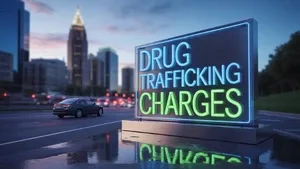North Carolina Drug Trafficking Charges: What You Need to Know
 Under N.C.G.S. § 90-95(h), drug trafficking in North Carolina refers to the unlawful sale, delivery, transportation, or possession of a minimum quantity of a controlled substance. Unlike simple possession or intent to sell, trafficking charges are based almost entirely on the type and amount of the substance involved. This is true whether the alleged act occurred in Charlotte or anywhere else in the state.
Under N.C.G.S. § 90-95(h), drug trafficking in North Carolina refers to the unlawful sale, delivery, transportation, or possession of a minimum quantity of a controlled substance. Unlike simple possession or intent to sell, trafficking charges are based almost entirely on the type and amount of the substance involved. This is true whether the alleged act occurred in Charlotte or anywhere else in the state.
If you've been charged with a trafficking offense and you're unsure what the law actually says, it's a good idea to speak with a criminal defense lawyer who handles drug cases in North Carolina. Powers Law Firm is based in Charlotte and represents people in the surrounding metro region, including Mecklenburg, Union, Gaston, Iredell, and Lincoln Counties, in serious felony drug matters. Call or text 704-342-4357 to schedule a confidential consultation. Find our office on Google Maps
Controlled Substances Under 90-95(h)Trafficking statutes apply to a range of substances, including but not limited to:
- Marijuana
- Cocaine
- Heroin
- Opium
- Methamphetamine
- Amphetamine
- MDMA (Ecstasy)
- LSD
- MDA
- Synthetic cannabinoids
- Mephedrone
In North Carolina, trafficking charges under N.C.G.S. § 90-95(h) are triggered when a person possesses, sells, delivers, or transports a threshold amount of a controlled substance. For certain substances, such as marijuana and opiates, manufacturing can also support a trafficking charge. “Manufacture,” as defined in N.C.G.S. § 90-87(15), includes producing, preparing, packaging, or repackaging a controlled substance.
How Much Is Enough to Be Charged with Trafficking in NC?The weight of the substance, not its purity, determines whether the charge qualifies as trafficking. This rule includes mixtures. Even if the illegal drug is only a small percentage of the total weight, the full weight counts.
Drug Weight Thresholds Under North Carolina LawExamples of minimum thresholds:
- Marijuana: 10 pounds
- Cocaine: 28 grams
- Heroin: 4 grams
- Methamphetamine: 28 grams
If a defendant sells 13 grams of powder that contains only 3 grams of heroin, the entire 13 grams is counted.
For offenses after September 1, 2009, the weight includes the total powder or liquid mixture, not just the pure drug content.
Does It Matter If You Were Selling, Delivering, or Transporting?Yes, each act supports a trafficking charge independently. You do not have to be caught selling drugs to be charged.
Legal Distinctions and Statutory ElementsThe prosecution must prove:
- The act: That you sold, delivered, transported, or manufactured the drug
- The substance: That it was one listed under 90-95(h)
- The weight: That it met or exceeded the statutory threshold
Prosecutors must show that you knew you were handling a controlled substance. However, they do not have to prove that you knew the exact weight.
Knowledge of Substance vs. Knowledge of WeightA person can be convicted of trafficking even if they did not realize the substance weighed enough to qualify under the law.
Examples of NC Drug Trafficking Charges Cocaine in a Powder MixtureSelling 29 grams of a mixture that contains only 5.5 grams of cocaine qualifies as trafficking in cocaine.
Heroin Purity vs. Total WeightPossessing 13.2 grams of a powder that is 30% pure heroin qualifies as trafficking because the full weight is over 4 grams.
What Triggers Felony Trafficking in PracticeWhether you are caught selling drugs, delivering to another person, or transporting them in a vehicle, the total weight of the substance controls the charge.
Charlotte Drug Trafficking Defense Strategies Challenging the Amount or WeightIf the substance weighs less than the statutory threshold, trafficking does not apply. Testing and lab analysis may be central to your defense.
Lack of Knowledge or IntentNorth Carolina law does not require the State to prove that you knew the exact weight of the substance. However, to be convicted of trafficking, the State must still show that you knowingly possessed or transported a controlled substance. A limited defense may arise if you genuinely did not know that the substance was in your possession at all. For example, if someone else placed the item in your bag, car, or home without your knowledge, and you had no reason to be aware of it, the element of knowing possession may be challenged. This defense is rare and fact-dependent, requiring strong corroborating evidence.
Distinguishing Trafficking from Simple PossessionSomeone charged with possessing marijuana may expect a misdemeanor if they believe it's for personal use. But in North Carolina, possession of more than 10 pounds can lead to trafficking charges, even without evidence of intent to sell. That threshold is based on weight alone. While some cases may be negotiated below the trafficking level, the consequences depend heavily on the specific facts and how the case is handled in court. It's important to consult a criminal defense lawyer to understand what options may be available. Learn more about how simple possession of marijuana in North Carolina is charged and how it differs from felony-level trafficking cases.
Penalties for Drug Trafficking in North Carolina Mandatory Minimums and Sentencing ClassesDrug trafficking charges in North Carolina carry mandatory prison time. Sentences are determined by substance and weight, not by the defendant's criminal record.
Marijuana Trafficking Penalties- 10 to 49 pounds: Class H felony, 25 to 39 months in prison, $5,000 fine
- 50 to 1,999 pounds: Class G felony, 35 to 51 months, $25,000 fine
- 2,000 to 9,999 pounds: Class F felony, 70 to 93 months, $50,000 fine
- 10,000 pounds or more: Class D felony, 175 to 222 months, $200,000 fine
The defendant’s prior record level (PRL) does not affect sentencing. Active prison time is mandatory.
Why First-Time Offenders Still Face PrisonEven if you have never been in trouble before, you will face an active sentence if convicted of drug trafficking in North Carolina.
Is Drug Trafficking a Felony in North Carolina? Class C–H Felony Levels ExplainedTrafficking charges range from Class H to Class C felonies depending on the drug and amount. Class C is the most severe, often involving large quantities or highly dangerous substances.
How Fines and Prison Time Are DeterminedEach controlled substance has its own threshold and associated penalty. The statute outlines mandatory fines and prison terms.
Why Trafficking Is Treated Differently Than Other Drug CrimesBecause trafficking is considered a threat to public safety, the law imposes harsher penalties than for simple possession or PWISD.
Can You Get Probation for Drug Trafficking in NC? No Community or Intermediate PunishmentJudges have no discretion to impose probation in trafficking cases. These offenses mandate active time.
Active Time Is MandatoryWhile trafficking offenses carry mandatory minimum sentences under the statute, there are limited circumstances where negotiations may affect the outcome. These charges are not eligible for deferred prosecution or suspended sentences in the traditional sense, but legal strategies sometimes exist depending on the specific substance, weight, and overall posture of the case. Every matter should be reviewed carefully to determine what, if any, relief is possible.
Should You Talk to a Lawyer Before Going to Court? Why Trafficking Charges Are High-StakesTrafficking convictions mean years in prison, thousands in fines, and a permanent felony record. These cases are not minor drug charges.
How Defense Lawyers Evaluate Trafficking CasesA defense attorney will analyze lab reports, weight calculations, search procedures, and your knowledge of the substance. They may also identify constitutional or evidentiary issues.
What Your Charlotte Criminal Defense Attorney Can DoIf you have been charged in Mecklenburg County or anywhere in the Charlotte region, contact a defense lawyer immediately. Prompt legal guidance can preserve defenses and mitigate consequences.
Other North Carolina Drug Charges You Should Know About- Possession of a Controlled Substance on Jail or Prison Premises
- Trafficking in Marijuana in North Carolina
- Possession with Intent to Manufacture, Sell, or Deliver (PWISD)
- Feloniously Dispensing a Controlled Substance
- Felony and Misdemeanor Drug Possession Charges
- Possession of Immediate Precursor Chemicals
 The following resources provide additional context on felony and misdemeanor drug charges in North Carolina, including sentencing consequences and related offenses.
The following resources provide additional context on felony and misdemeanor drug charges in North Carolina, including sentencing consequences and related offenses.
- Possession with Intent to Sell or Deliver (PWISD) in NC
- Felony Drug Charges in North Carolina
- Simple Possession of Marijuana in NC
- Counterfeit Controlled Substances
- What Happens After a Felony Conviction in NC
Call or text Powers Law Firm at 704-342-4357 to schedule a confidential consultation. We represent clients charged with felony drug trafficking in Charlotte and throughout the surrounding metro counties: Mecklenburg, Union, Gaston, Iredell, and Lincoln.
Helpful Information About Criminal Charges- North Carolina Criminal Law Chapter 90-95: Possession of a Controlled Substance With Intent to Manufacture, Sell or Deliver
- North Carolina Drug Laws: Felony Drug Charges and Misdemeanor Drug Possession Charges
- North Carolina Criminal Law 90-95(a)(2): Creating a Counterfeit Controlled Substance
- What is Simple Possess Sch VI CS M in North Carolina?
- What Happens When Convicted of a Felony?
 Powers Law Firm PA Home
Powers Law Firm PA Home













